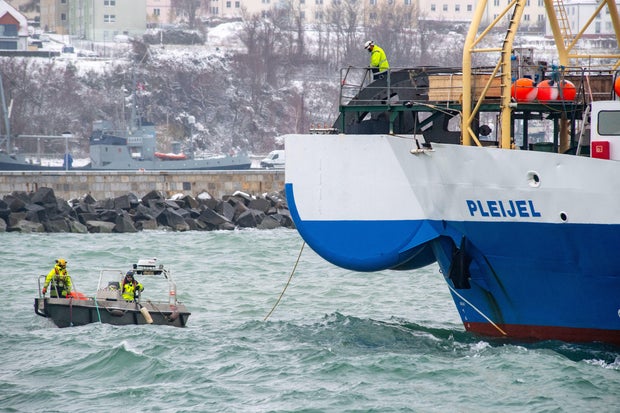Two undersea cables carrying internet data deep in the Baltic Sea have been damaged, European telecommunications companies have said, drawing warnings from European governments of possible Russian “hybrid warfare” targeting global communications infrastructure.
The foreign ministers of Finland and Germany said in a joint statement on Monday that a cable connecting the two countries had been cut and that the incidents had raised suspicion of possible sabotage.
“A thorough investigation is underway. Our European security is not only under threat from Russia’s war of aggression against Ukraine, but also from hybrid warfare by malicious actors,” the ministers said, without blaming any particular entity for the possible sabotage.
Stefan Sauer/picture alliance/Getty
The Finnish company Cinia confirmed Monday that its submarine cable between Finland and Germany was damaged. The cable is about 730 miles long and connects telecommunications networks in central Europe to Finland and other Nordic countries.
“The details of the fault are yet not known and are currently being investigated,” the company said in a statement on its website.
Swedish company Arelion confirmed to CBS News on Tuesday that one of its cables was also damaged.
“We can confirm that one of our subsea fiber cables — the one between Gotland, Sweden and Šventoji, Lithuania — is damaged. The issue was detected on November 17, and we currently do not know what caused it as we have not been able to examine the cable,” Arelion spokesperson Martin Sjögren told CBS News.
“Arelion is in contact with Swedish authorities and the Swedish Armed Forces regarding the incident. The cable will be repaired over the next few weeks depending on weather conditions,” he said.
Audrius Stasiulaitis, a spokesperson for the Swedish multinational telecom company Telia, which uses and operates the Arelion cable, said the firm believed the cable was physically damaged.
“We can only speculate on what has happened, but as far as we see, it is not affected by equipment failure and we presume it’s physical damage,” he told CBS News over the phone on Tuesday.
The damage to the cables comes after reports over the past year that Russia may be targeting key infrastructure connecting Nordic countries.
An April 2023 joint investigation by the public broadcasters of Sweden, Denmark, Norway and Finland found that Moscow was operating a fleet of suspected intelligence vessels in Nordic waters as part of a Kremlin campaign potentially aimed at targeting underwater cables and wind farms.
There have been attacks on European infrastructure since Russia launched its full-scale invasion of Ukraine 1,000 days ago.
In September 2022, the Nord Stream 1 and Nord Stream 2 pipelines, both designed to carry natural gas from Russia to Germany under the Baltic Sea, were damaged by explosions.
Both Ukraine and Russia denied any involvement in the explosions. In August, German media reported that prosecutors had issued an arrest warrant for a Ukrainian man over the pipeline attacks.
Sweden and Finland have both joined the NATO military alliance over the past two years, as the war in Ukraine fuels concern about Russia’s possible intentions, and just this week, both countries updated their war preparation guidance and published online booklets for citizens to prepare for the eventuality of a war or other crisis.


